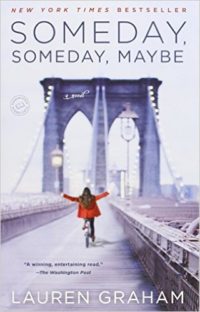The lens feels like another person in the room
 Someday, Someday, Maybe
Someday, Someday, Maybe
by Lauren Graham
I’ve been meaning to read this novel for a couple of years, and this month it seemed that all signs point to it. Lauren Graham is the star of Gilmore Girls, which I love and which is coming back after nine years in a Netflix miniseries that starts on 25 November. It’s marked in my diary and I am very excited. Someday, Someday, Maybe was Graham’s debut novel, soon to be followed up by Graham’s collection of essays Talking As Fast As I Can (pub date 29 November; apparently it includes some spoilers of the new TV show).
This novel is pretty nakedly inspired by earlier events in Graham’s own life, though I wouldn’t go so far as to call it autofiction. It’s about Franny Banks, a wannabe actress struggling to make it in New York City. She has given herself a strict three years to achieve her goal – that is, to earn enough from acting to live on – and that deadline, when the book opens, is six months away. She’s not a hopeless case – she’s done an advert, has an agent and goes to acting classes run by the highly selective and respected John Stavros. But her agency only books commercials, her only income is from working as a waitress at a comedy club and her dream of one day appearing in An Evening with Frances Banks at the 92nd Street Y is receding.
This is a warm, funny portrait of people in their late-20s trying to live their dreams, scraping by in the city they have pinned those dreams to. Franny’s room-mates Dan (a law graduate who is trying write a sci-fi film) and Jane (a production assistant who aspires to produce her own films) are interesting and likeable, but as the story is narrated by Franny we largely see them in relation to her – i.e. giving her advice or sharing meals with her or complaining about her sleeping through her loud alarm.
“Facing me from about 15 feet away are two women, both in their 30s, with matching parted-down-the-middle stick-straight hair. Vintage Glasses pops a tape in the camera and a red light near the giant black lens comes to life. The lens feels like another person in the room, a person who never speaks or smiles, who only stares without blinking, never looking away.”
Interspersed through the book are pages from Franny’s Filofax, detailing her appointments, her shifts at work, her reminders to herself (“Call Dad”, “Mail rent check”, “Buy pens”) and her goals achieved (“Ran 3 miles”, “One week and no cheese puffs”) plus doodles that generally made me laugh. She’s teased for the old-fashionedness of her Filofax, despite the story being set in the 1990s, before Google Calendar or affordable mobile phones. (And to be honest my diary that I use now isn’t much different. But I am also teased for having a physical paper diary.) It occasionally acts as part of the story itself, detailing time passing. At other times it’s a preview of the chapter to come. It’s a nice addition.
“His canvas book bag hit my canvas book bag just as he passed. It’s like our shoulder bags kissed. The thought of our shoulder bags kissing and eventually falling in love and moving in together makes me smile a little, which is bad, because finding myself amusing is taking up the space I need in my brain to conjure a way to be charming.”
Franny’s story is predictable, but she is an intelligent character, aware of her mistakes when she makes them. And the background is a witty, often biting portrait of the TV and film industry that manages not to fall back on stereotypes.
I’m looking forward to Graham’s next book even more now that I’ve confirmed my suspicion that she can write well.
Published 2014 by Random House.
Source: Amazon.